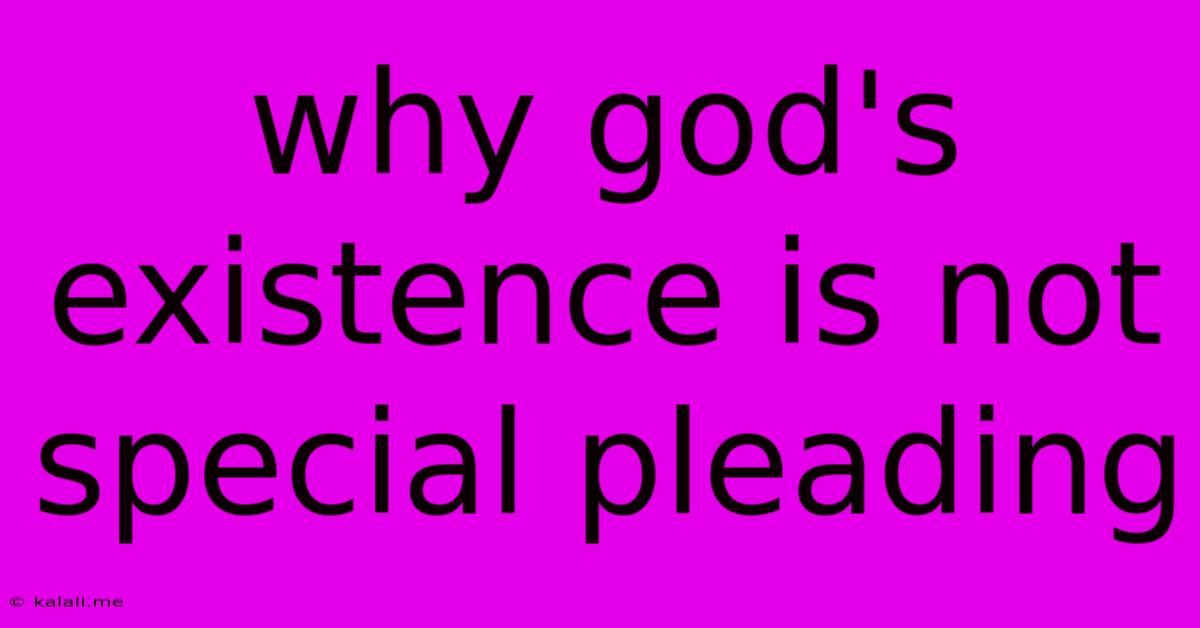Why God's Existence Is Not Special Pleading
Kalali
May 31, 2025 · 3 min read

Table of Contents
Why God's Existence Isn't Special Pleading: A Philosophical Examination
Meta Description: The "God of the Gaps" argument often faces the criticism of special pleading. This article explores why this isn't necessarily the case, examining the philosophical nuances surrounding the existence of God and the limitations of scientific explanation. We'll delve into the arguments for and against special pleading in the context of theological discourse.
The argument for God's existence often encounters the accusation of special pleading. This criticism alleges that believers are employing a double standard: they invoke God to explain unexplained phenomena while simultaneously rejecting alternative explanations for the same phenomena. However, a closer examination reveals this accusation to be a simplification of a complex philosophical issue. This article will explore why framing the existence of God as "special pleading" is an oversimplification and often a mischaracterization of theological arguments.
Understanding Special Pleading
Special pleading, in the context of philosophical arguments, refers to the use of double standards or exceptions to rules to support a particular conclusion. It's a fallacy where one applies a different set of standards to their own claims compared to similar claims made by others. For instance, claiming that a specific scientific law doesn't apply to a particular event without sufficient justification would be considered special pleading.
The "God of the Gaps" Criticism
The criticism of "God of the Gaps" often fuels the special pleading accusation. This argument suggests God fills in the "gaps" in scientific understanding – areas where science hasn't yet provided an explanation. Critics argue this is special pleading because it's a convenient way to avoid facing scientific challenges and resorting to a supernatural explanation without proper evidence. They contend that as scientific understanding advances, the "gaps" shrink, and the need for a divine explanation diminishes.
Why This Isn't Always Special Pleading
However, equating all arguments for God's existence with "God of the Gaps" is inaccurate. Many theological arguments exist that don't rely on unexplained phenomena. These include:
-
Cosmological Arguments: These arguments posit that the universe's existence requires a first cause or uncaused cause, often identified with God. This isn't about filling gaps in scientific knowledge but questioning the very foundations of existence.
-
Teleological Arguments: These arguments point to the apparent design or purpose in the universe, suggesting a designer – God. While the specifics of the design can be debated, the argument itself isn't contingent on scientific ignorance.
-
Moral Arguments: These arguments propose that the existence of objective morality points towards a moral lawgiver – God. This argument operates within the realm of ethics and philosophy, independent of scientific explanations.
-
Experiential Arguments: Many believe in God based on personal experiences, religious revelations, or spiritual encounters. These are subjective, but they are not based on filling gaps in scientific understanding.
These arguments represent different philosophical approaches, and to label them all as "special pleading" is to disregard their distinct methodologies and logical structures. The existence of God, for many believers, is not simply a response to scientific uncertainties, but a fundamental belief supported by various lines of reasoning.
The Limits of Scientific Explanation
It's crucial to acknowledge the limitations of scientific explanation. Science excels at explaining how things work, but it struggles to answer questions of why things exist or what the ultimate purpose of existence might be. These questions often lie outside the purview of science and are addressed through philosophy, theology, and personal beliefs. Arguing that God's existence is special pleading because science hasn't provided an answer overlooks this fundamental difference.
Conclusion
While the accusation of special pleading is frequently leveled against arguments for God's existence, it’s a simplistic and often misleading characterization. Many theological arguments operate independently of scientific "gaps," addressing fundamental questions about existence, morality, and purpose. A nuanced understanding of the philosophical landscape and the limitations of scientific explanation is essential before dismissing arguments for God's existence as mere special pleading. The debate is far more complex and involves diverse philosophical and theological perspectives.
Latest Posts
Latest Posts
-
How To Mod Weapons Fallout New Vegas
Jun 02, 2025
-
On Whatsapp What Does One Tick Mean
Jun 02, 2025
-
Can Water Heaters Be Laid On Their Side
Jun 02, 2025
-
How To Calculate Open Circuit Voltage
Jun 02, 2025
-
Ground Wire Size For 100 Amp Service
Jun 02, 2025
Related Post
Thank you for visiting our website which covers about Why God's Existence Is Not Special Pleading . We hope the information provided has been useful to you. Feel free to contact us if you have any questions or need further assistance. See you next time and don't miss to bookmark.